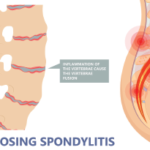 UPDATE: On Jan. 15, Novartis announced that it had received two new FDA approvals for Cosentyx to treat patients with ankylosing spondylitis and psoriatic arthritis in the U.S.
UPDATE: On Jan. 15, Novartis announced that it had received two new FDA approvals for Cosentyx to treat patients with ankylosing spondylitis and psoriatic arthritis in the U.S.
As this article was being edited, anti-TNF agents were the only biologics approved for the treatment of ankylosing spondylitis. A new treatment, however, is now available. Secukinumab, an anti-interleukin-17A monoclonal antibody, is currently being investigated as an alternative treatment for patients with ankylosing spondylitis. Phase 3 clinical trials are now complete, and the efficacy of secukinumab further supports the hypothesis that interleukin-17A plays an important role in the pathogenesis of ankylosing spondylitis.
Dominique Baeten, MD, professor of rheumatology at the University of Amsterdam in the Netherlands, and colleagues published the results of the two Phase 3 trials (MEASURE 1 and MEASURE 2) of secukinumab online on Dec. 24, 2015, in the New England Journal of Medicine.1 The results extended the positive findings from the Phase 2 trial. The safety profile of secukinumab in the Phase 3 trials was also consistent with what had been documented previously.
MEASURE 1 took place from Nov. 9, 2011, though Jan. 21, 2013, and included 371 patients with active ankylosing spondylitis. MEASURE 2 took place from Oct. 28, 2012, through July 29, 2013, and included 219 patients with active ankylosing spondylitis. The two studies differed in that patients in the treatment arms of MEASURE 1 received intravenous secukinumab (10 mg/kg of body weight) at Weeks 0, 2 and 4. They then received subcutaneous secukinumab (150 mg or 75 mg) every four weeks starting at Week 8. In contrast, patients in the treatment arms of MEASURE 2 did not receive intravenous loading of secukinumab. Instead, they received subcutaneous secukinumab at Weeks 1, 2 and 3, and then every four weeks starting at Week 4. The primary endpoint of both studies was the proportion of patients with at least a 20% improvement in Assessment of Spondyloarthritis International Society (ASAS20) response criteria at Week 16.
Efficacy
Patients with ankylosing spondylitis who were treated with 150 mg secukinumab subcutaneously experienced significant reductions in signs and symptoms at 16 weeks. A dose of 75 mg resulted in significant improvements only in patients who had a higher intravenous loading dose (MEASURE 1). MEASURE 1 ASAS20 response rates at Week 16 were 61% (150 mg), 60% (75 mg) and 29% (placebo). In MEASURE 2, the rates were 61% (150 mg), 41% (75 mg) and 28% (placebo). In MEASURE 2, the response to 75 mg secukinumab was not statistically significant relative to placebo.



